Young man Nguyen Tat Thanh left to find a way to save the country.
Setting foot in the land of "directly governed Nam Ky", Nguyen Tat Thanh witnessed with his own eyes the sophisticated and cruel way of governing and exploiting by the French capitalists. And it was also from here, at Nha Rong Port, that a patriotic young Vietnamese man boarded the merchant ship Admiral Latouche-Tréville with the desire to learn the best and progress from countries around the world to help his compatriots. This was an important milestone marking the journey on the road to national salvation of Van Ba - Nguyen Tat Thanh - Nguyen Ai Quoc - Ho Chi Minh.
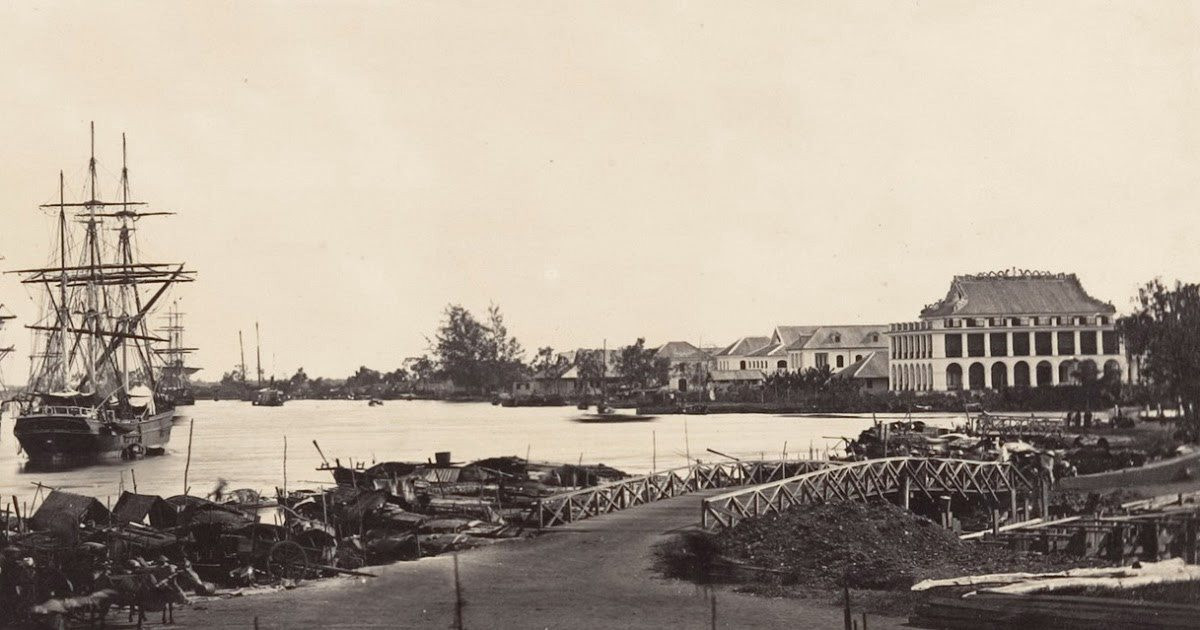
One spring morning in 1911, teachers and students of Duc Thanh School (Binh Thuan Province) could no longer hear the whistle calling for physical exercise from teacher Nguyen Tat Thanh. When had he left? In the room, there were only a few farewell lines from colleagues and students of the whole school. So the teacher had gone far away! Students of Duc Thanh School will always remember the image of the young teacher with a tall and slender figure, bright, sparkling eyes full of affection, short hair, dressed simply in a white ao ba ba, a lily-colored belt and boundless love for his beloved juniors.
While the teachers and students of Duc Thanh School were still struggling with the sudden separation, Nguyen Tat Thanh had set foot in the land of "directly governed Nam Ky". That was a positive result that not everyone could easily achieve.
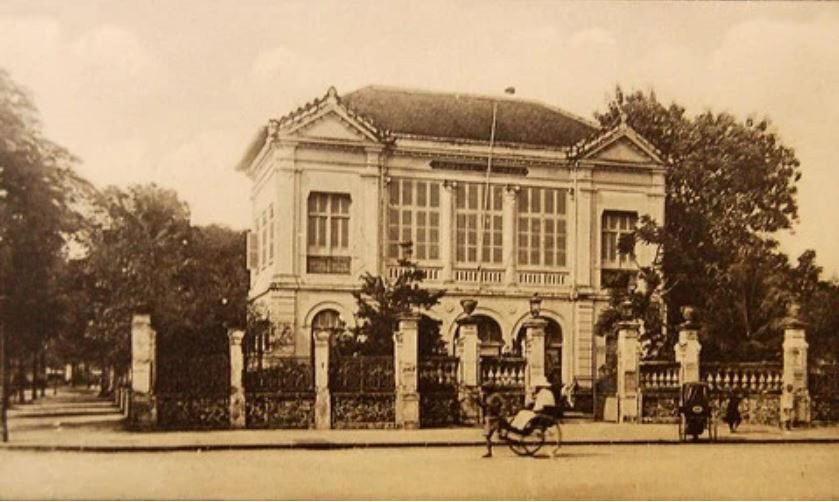
For Binh Thuan province at that time, Saigon was like another country, very difficult to get in and out of. Even Mr. Phan Chau Trinh had to wait for months without being able to cross the Binh Thuan - Saigon border. The reason Nguyen Tat Thanh was able to cross was thanks to going by boat with Mr. Ho Ta Bang, an old friend of Mr. Nguyen Sinh Sac when he was in Hue; he was the one who had great contributions in establishing "Lien Thanh Trading House" and opening Duc Thanh School.
Arriving in Saigon, Nguyen Tat Thanh began to get acquainted with the new things of the "directly governed" land of France. Compared to the cities he had been to, Saigon was indeed much more massive and bustling. The pace of life here was very hurried and tense. Only when he arrived here did Nguyen Tat Thanh witness with his own eyes the sophisticated and cruel way of governing and exploiting by the French capitalists. The number of hired workers was growing and was present in all factories and enterprises. The cheap labor force here was a lucrative source of income for the "sharks" of French capitalism.
On the streets of Saigon, "Western men and women" were everywhere. Nguyen Tat Thanh witnessed with his own eyes the brutal attitude of the French towards the Vietnamese people, especially towards women. Right in the middle of Ben Thanh market in Saigon - which people said was a French city - the European guards also used bullwhips and batons to beat the local women to make them move away and not block the way.
The more Nguyen Tat Thanh penetrated into the lives of the working masses, the more he hoped for the “people’s spirit” of Cochinchina. The miserable life under the direct rule of French colonialism made the uprising spirit of the people of Cochinchina even stronger.
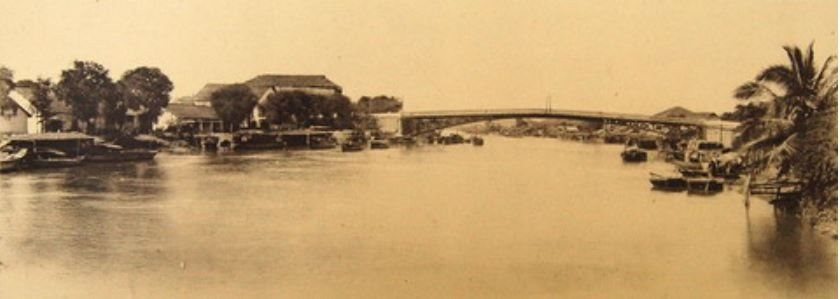
To survive and find a way to go abroad, Nguyen Tat Thanh had to do many manual labor jobs in Saigon. The place he often stayed and visited many times was Nha Rong Port. It was a river port. It was called "Nha Rong" because here, on the roof of the French Maritime Agency building, there were two dragons facing the sun.
Nguyen Tat Thanh paid close attention to shipping companies. There were two large shipping companies operating on the France-Indochina route. They were the Mesagieri Maritime, also known as the "Horsehead" company; and the Sargiereuni, also known as the "Nam Sao" company. It was easy to distinguish between the two companies; he only had to look at the smokestacks of the ships painted with the shape of a horse's head or five stars. He learned that the Nam Sao company had many advertisements printed in both French and Chinese, listing its route: Saigon - Touran - Haiphong - Singapore - Colombo - Ghibuti - Posai - Marseille - Bordeaux - Lehavero - Dongker.
He also knew another very interesting thing: Nam Sao Company was recruiting “Annam waiters” to serve passengers on the ship. His intention would soon be realized. He would go to Europe, where the trend of free thought, democracy and science and technology was developing, to examine, research and find the right way to save the country.
At noon on June 2, 1911, he went to Nha Rong Port. The Nam Sao ship from Tuaran (Da Nang) had just docked. He went straight to the Amiran Latusơ Tơrêvin to ask for a job.
At first, he met three Vietnamese people working in the dining room. He boldly presented his request for a job. They replied that there was no job, and even if there was, they had no right to hire him. Seeing them laugh and whisper something to each other, he guessed their thoughts: "What kind of work can a skinny person like that do on this ship?" He was a little disappointed. But then one of them, with a kind face, patted him on the shoulder and said: "Follow me, I will take you to the ship owner. Maybe he will have work for you."
Seeing him, the ship's owner, Louis E. Michell, was a little hesitant, because standing before him was a tall, thin young man, more like a student than a worker, but with a handsome face and very bright eyes. He asked:
- What can you do?
- I can do anything!
Hearing the young man's decisive, resolute, and confident answer, the ship owner promised:
- Okay, I will hire you as a kitchen assistant. Come here tomorrow morning to get the job.
The night before leaving his homeland and country, Tat Thanh was restless and restless, just hoping for morning to come soon. Tomorrow would mark a major turning point in his life. The ambition to leave to find a way to liberate the nation had been in his heart since his days in the capital Hue, and now he had the opportunity to realize it. Without a companion, he would live and fight, overcoming all difficulties and challenges with his own hands and intelligence and willpower. Completely voluntarily embarking on the path of wandering and adventure, he did not hesitate or think twice. However, before saying goodbye to his homeland and country, his heart could not help but be moved and sad. Thinking about his family, his heart was filled with emotion and sobbing. He regretted that he had not found his father's place of residence before leaving.
He also did not know whether the sources of information about the activities of his sister Nguyen Thi Thanh (Bach Lien) and brother Nguyen Sinh Khiem (Tat Dat) were authentic or not?This trip of his will probably be very long, not knowing when he will see his relatives again...
Early the next morning (June 3, 1911), Nguyen Tat Thanh with his new nameVan Bawas accepted to work on the ship. Now he knew the names of the three Vietnamese people he had met for the first time yesterday. They were Nguyen Van Hum, Nguyen Van Ba and Bui Van Vien. And also recruited to work on the ship that day were four young men from the countryside: Le Quang Chi, Dang Quan Rao, Nguyen Tuan and Nguyen Van Tri.
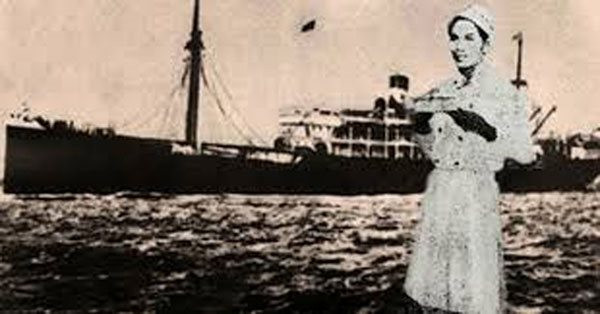
The ship owner kept his promise and assigned Van Ba to be a kitchen assistant. As a kitchen assistant, he had to wake up before 4am every day and from then until 9pm, he had to do one thing after another: sweeping the big kitchen, lighting fires in the furnaces; carrying coal, going down to the hold to get food; washing vegetables, cleaning pots and pans. Sometimes, he had to carry a heavy bag up the stairs while the ship rocked... All day long, his body was covered in sweat and coal dust. Although he worked too hard, he was still calm, patient and cheerful. Every night, after 9pm, when the work was done, everyone gathered to play cards, while Ba read and wrote diligently until late at night.
Before the ship left the dock, Mr. Ba suddenly saw Mr. Bui Quang Chieu, an agricultural engineer, and his family traveling first class. He had sent his son to study in France; he had entered the "Western village" (acquired French citizenship). He called Van Ba over and gently advised: "Why do you do this difficult job? Quit this job! You should choose another more prestigious job...".
Mr. Ba politely thanked Mr. Chieu. He had made up his mind. He just wanted him to know what he had been thinking about, which he had once told a friend:
I want to go abroad to see France and other countries. After seeing how they do it, I will return to help our people.
Nguyen Tat Thanh
Those were ripe ideas, the long-cherished and fervent wishes of Nguyen Tat Thanh. That great ambition gave him strong faith, extraordinary willpower and high determination.
Once the hatred for the invaders and traitors boiled and the love for the Fatherland and compatriots burned, no force could stop the young man from finding a way to save the country.
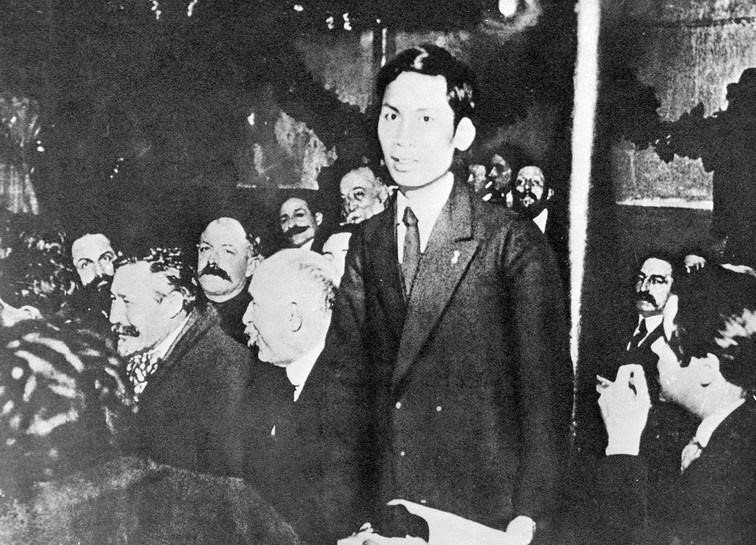
On June 5, 1911, after taking a roll call of all 72 sailors and staff on board and requesting a certificate stamp in the ship's log, the Admiral Latouche Tréville blew a long whistle and left Nha Rong Port for Singapore... to France.
Nguyen Tat Thanh stared at the shore as if wanting to engrave in his mind the last image before the moment of leaving his homeland, his homeland filled with deep affection and love.
Like an eagle spreading its wings, young man Nguyen Tat Thanh will cross the ocean and travel around the world in search of the most ideal path for the cause of liberating the Vietnamese people.
Like a tireless bird flying across the five continents!...
